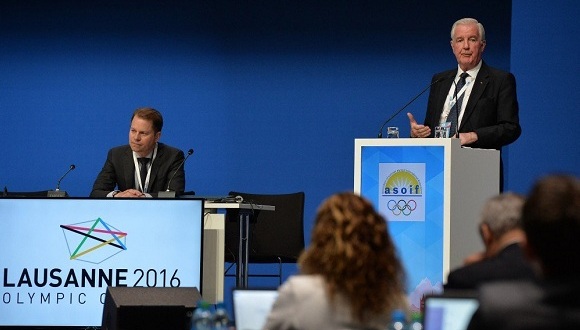Photo taken by Getty Images
During an interview with Yutang Sport, at the Sport Accord Convention in Switzerland, the director of WADA Olivier Niggli has emphasized their collaboration with the Chinese government, with the common goal of fighting against doping practices.
“We have very regular contact with China and with the Chinese Anti-Doping Agency” said the incoming director of WADA ,Olivier Niggli.
The World Anti-Doping Agency is also in discussions with the Chinese Government on how to better fight against the traffic of enhancing performance drugs.
He also commented on one of the most recent cases of Doping: Maria Sharapova being suspended due to doping misconduct. Mr Niggli maintains that the Tennis athlete’s guilt will not be reconsidered.
The Agency is currently analyzing the possibility of a residual amount of the substance due to consumption prior to the ban of January. Yet it cannot be applied to Sharapova, who has publicly declared that that she has consumed Meldonium after the ban of January 2016.
Mr Niggli highlights the fact that a cheating athlete needs to face the consequences of their act, including their association with brands: “Any decisions on anti-doping which are confirmed would have consequences on sponsorship”.
Continuously Fighting against Doping
Following the previous cases of doping in the world of sport, The World Anti-Doping Agency (WADA) launched a new anti-doping code in January 2015. More than one year after, WADA is looking at how to best implement this Code through its Compliance program, and also reinforce its investigative process.
Olivier Niggli, the incoming director of WADA, shared its perspectives during the Sport Accord Convention in Lausanne, Switzerland.
The main initiative following the new World Anti Doping Code is to ensure the compliance of the members of WADA. Around 600 institutions - from international federations to national entities, to laboratories - are signatories of this code, and so are committed to respect those rules. The compliance evaluation, which has been accredited recently, aims to make the signatories respect their commitments, and overall to elevate the level of anti-doping worldwide.
The main difference in the compliance process, compared to previous years, is that WADA is more focused on how it is implementing the rules. Indeed, WADA would like to bring more importance to the educational aspect of the process, with improved mentoring for their members on how to be compliant.
“The role of the program is to bring up the level of anti-doping worldwide, the primary focus is really to work together through dialogue and trying to improve”, said Mr. Olivier Niggli.
WADA monitors each of the signatories to ensure they respect the anti-doping Code, and are evaluated whether they are compliant or not. For that purpose, independent experts are in charge of making recommendations to WADA regarding compliance. These experts are not specifically linked to the sports industry, but are experts in compliance from other fields (e.g. Pharma, airlines). They will take a very technical and neutral approach; and avoid any political involvement.
Yet, WADA’s wish is to have dialogue with their signatories, and provide them assistance to keep in line with the World Anti-Doping Code. For example, the process provides for a month’s delay between the first notification of non-compliance and the start of an investigation by the Compliance Review Committee.
When an entity is declared non-compliant, there can be different consequences, depending on the role of the entity. If it is directly associated to the WADA organization, such as laboratories in various countries, WADA could suspend their activity.
This is the situation presently for the Laboratories in Russia, which have been suspended by WADA. RUSADA was declared non compliant as well, and thus no longer in charge of the Anti-Doping actions in Russia.
In parallel, the International Olympic Committee and the International Federation have the power to suspend associations that are under their rules. Considering the same case of Doping in Russian Athletics, WADA couldn’t impose a direct sanction. Nevertheless, the IAAF follows the decision of the World Anti-Doping Agency, and have the right to sanction the national federation – therefore the IAAF suspended their National Federation, ARAF.
As of today, the compliance process has already declared some signatories non-compliant, and is currently monitoring 300 out of 600 signatories of the World Anti-Doping Code.
The other key initiatives that WADA is focusing on improving are investigation, management of information and intelligence gathering.
Since the new World Anti-Doping Code, launched in January 2015, Wada has more power than before, and can now launch investigations more easily. Nevertheless, Wada does not have the power of a Police investigation, and therefore their Education and Compliance mission remains key in the fight against Doping. In most cases, WADA still relies on the co-operation of governments and other organizations to conduct efficient investigations.
After a sanction or a suspension, there is still need for an anti-doping structure. In the case of Athletics in Russia, the athletes that are willing to participate in the Olympic Games in Rio would need to be tested by a laboratory approved by WADA. Following the suspension of RUSADA, and the laboratories conducting the anti-doping test, the UK anti-doping organization is taking this role in the interim, and will be running the test in Russia. Furthermore, WADA is aiming to build a panel of independent experts, who are not involved in Russian politics, in order to rebuild RUSADA, and work on re-accreditation of laboratories there. It is indeed an urgent matter to have accredited laboratories in Russia, as the blood testing can only be done in the immediate aftermath of competition, and thus requires a location nearby.
WADA has shown today at the Sport Accord Convention that it is continuing its mission against cheating in Sport, with a stronger strategy on compliance and improving their intelligence gathering; led by their incoming Director General Olivier Niggli.
Olivier Niggli, incoming director of WADA – An update of the implementation of the 2015 Code and the WADA compliance program
